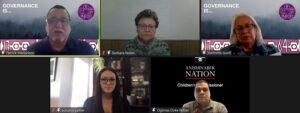Anishinaabe Governance is a First Nation driven process

By Marci Becking
ANISHINABEK NATION TERRITORY— Day Two of the Anishinabek Nation Governance Summit Series II “Anishinaabe Miikan: Our Journey” on Feb. 17 saw some 100 participants listen to a First Nations panel on transition, change management and implementation, a discussion with Anishinabek Nation commissioners and Nation Councils, respectively.
Fred Bellefeuille, legal counsel, kicked off the day with a presentation on the outcome of last year’s summit. One of the questions asked last year was: How do you want the Anishinabek Nation governance to serve First Nations members and communities?
“The message was unified in a number of areas,” said Bellefeuille. “First Nations have to drive this process. It has to be First Nation driven. Whatever the Anishinabek Nation evolves to, it has to be in control of the First Nations. Another message was streamlining voting periods so we can have elections at similar times. A lot of people talked about exclusion and inclusion, equality, Dodemaag System, Ngo Dwe Waangizid Anishinaabe and maintaining that principle.”
“The Anishinabek Nation has to provide advocacy when dealing with outside governments and global nations, sharing best practices, a clearinghouse for information, providing opportunities for people to find their dodem and learn more about the Dodemaag System.”
Chief Barron King of Moose Deer Point First Nation says his community ratified the proposed Anishinabek Nation Governance Agreement last year.
“The pandemic has affected schedules. I really thought by now we’d be implementing and moving ahead in terms of making our own laws,” said Chief King. “We look forward to the day that we do start. What my community ratified was the four areas of the Governance Agreement. I know what effect it will have when it comes to citizenship. When you look at the Indian Act – that policy – in one or two generations, a lot of communities will be extinct. We have to take control of all these languages. Our culture and language – I think that’s disappearing – and this a big opportunity to revive our culture and language. My people are excited to make their laws on leadership and elections. It’s grassroots. I know our citizens are excited to move ahead.”
Commissioner on Governance, Patrick Madahbee, hosted the Commissioners Panel, which included Language Commissioner Barbara Nolan, Chief Water Commissioner Autumn Peltier, Children’s Commissioner Ogimaa Duke Peltier, and Citizenship Commissioner Jeannette Corbiere Lavell.
Corbiere Lavell married David Lavell in 1970, a non-Indigenous man which meant she was no longer deemed an Indian according to the Indian Act. She challenged the Act in 1971 and though her challenge failed, she inspired a later challenge, the success of which “permitted reinstatement of First Nations women and children who had lost their Status.
“I’ve been through so much of the turmoil, the barriers, the struggles in trying to get back my own recognition – the right to belong,” said Commissioner Corbiere Lavell.
Corbiere Lavell gave an update on the work she’s been doing on E’Dbendaagzijig.
“We have our own E’Dbendaagzijig Naaknegewin, but I don’t believe we’ve put much emphasis on implementation, but it’s all there. It’s there and it can be used. I realized just reading some of our past history that, thanks to our leadership at the Anishinabek Nation, they knew what we were going through and could see that we were losing many of our people.”
She reminded us of a quote from past Grand Council Chief John Beaucage from 2007, “Only our traditional governments have the right to define our citizenry and criteria for citizenship for our communities and within our nation. We reject the Indian Act in its attempt to legislate and define who an Anishinabek citizen is and as such, we reject the concept of Indian Status.”
Throughout the two days, Anishinabek Nation Leaders and Elders stated that Anishinaabemowin is integral to Anishinaabe Governance. Language Commissioner Barbara Nolan inspired Anishinaabe citizens to acquire language.
“It is our identity,” she said.
Anishinabek Nation Head Getzit Nmishomis Gordon Waindubence said that in our own Anishinaabe governance system, “Our Anishinaabe thoughts, laws and policies will be at the forefront.”

